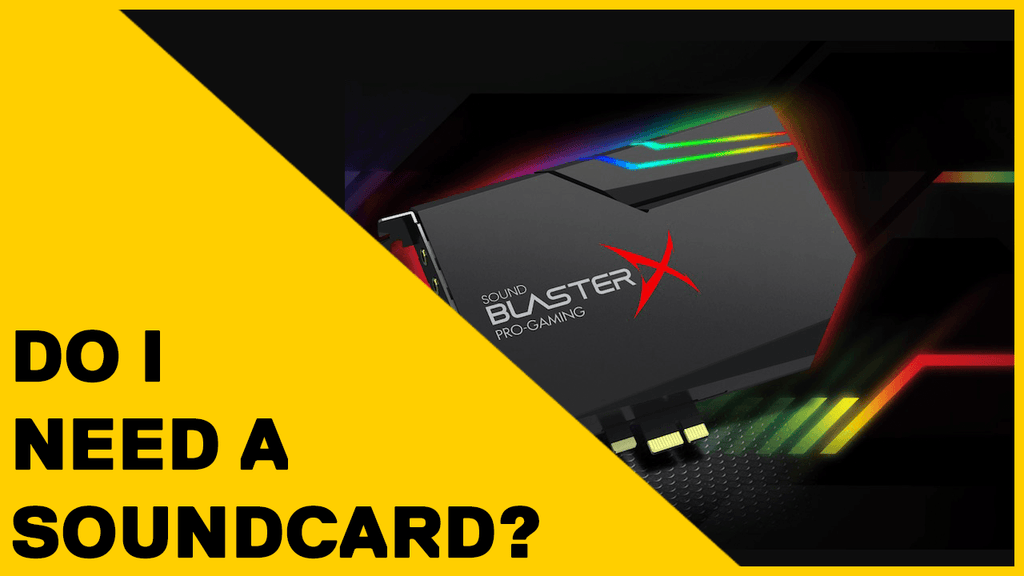
Are Sound Cards Still Necessary in Modern Gaming PCs? A Comprehensive Guide
![]() Craig Hume - MD @ Utopia
Craig Hume - MD @ Utopia
Published -
Wondering if a separate sound card is still necessary for your gaming PC? Well, let's dive in and find out!
What is a sound card?
A sound card, also known as an audio card, is a piece of hardware installed inside a computer. Its main purpose is to process and output audio from your computer. Think of it as the audio version of a graphics card but for your computer's sound system.
Additionally, most sound cards have various software-based audio processing tools that allow you to tweak the sound settings to your liking. These tools can include equalisers, surround sound simulators, and noise reduction filters.
In the past, a sound card was a must-have for any serious gamer looking to improve their audio experience. I remember my first sound card upgrade. It was about 20 years ago, and once fitted allowed me to hear in-game characters talk for the first time. I’m really showing my age now, LOL!
Is the sound on my motherboard OK for gaming?
In the past, sound cards typically had better audio processing capabilities and a wide range of customisation options to tweak the sound settings to your liking than the integrated sound found integrated on your computer's motherboard. But with technological advancements, motherboards now come with some seriously high-quality audio components built-in, and their software-based audio processing can do just as well as high-end add-on cards can provide in many situations. So in short, no, you don't need a sound card to enjoy great in game sound.
Do sound cards give me more audio ports?
Gaming PCs often need additional audio inputs and outputs, like digital audio or surround sound. And guess what? Most modern gaming motherboards also have built-in support for these features, making the need for a separate sound card even less crucial. They also have a built-in speaker and headphone jacks, which are ideal for most gaming setups. But a separate sound card may still be a good investment for the more serious audiophile gamers - those who plan on connecting audiophile-level speakers or headphones to their systems. This is an area where Sound cards can provide real additional value and will, in turn, give you the ultimate audio experience, allowing you to fully immerse yourself in the game and hear every little detail - as well as being able to fully appreciate your expensive speakers!
What are the audio ports on the back of my PC?
We have got a handy guide below:
|
Color |
Shape |
|
|
Optical |
Black |
Square |
|
Headphone/line out |
Green |
Round |
|
Microphone in |
Pink |
Round |
|
Line in |
Blue |
Round |
|
Digital out |
Yellow/White |
Round |
|
Subwoofer out |
Orange |
Round |
|
Rear surround sound |
Black |
Round |
|
Center channel |
Gray |
Round |
Experiencing Poor audio quality?
A sound card can be a solution to this problem. It shields internal components and creates distance from the noisiest parts of your PC, improving audio quality.
Another point to note is if you're a collector of FLAC or lossless audio files and your current setup doesn't support playback at the native sample rate or bit depth, a sound card can help you achieve optimal audio quality.
Additionally, in some rare cases, ultra-cheap computers may not have an audio output, or the integrated sound card may be very low quality, so a sound card or an external DAC and amplifier may be necessary.
Conclusion
In conclusion, a separate sound card is probably unnecessary for the average or even above-average gamer. Still, it could be worth considering for those who want the ultimate audio experience. It's all about finding the right balance between cost and performance that works for you. Still, got questions? Get in touch, and we can help answer any PC-related questions. In the meantime, happy gaming!

Leave a comment